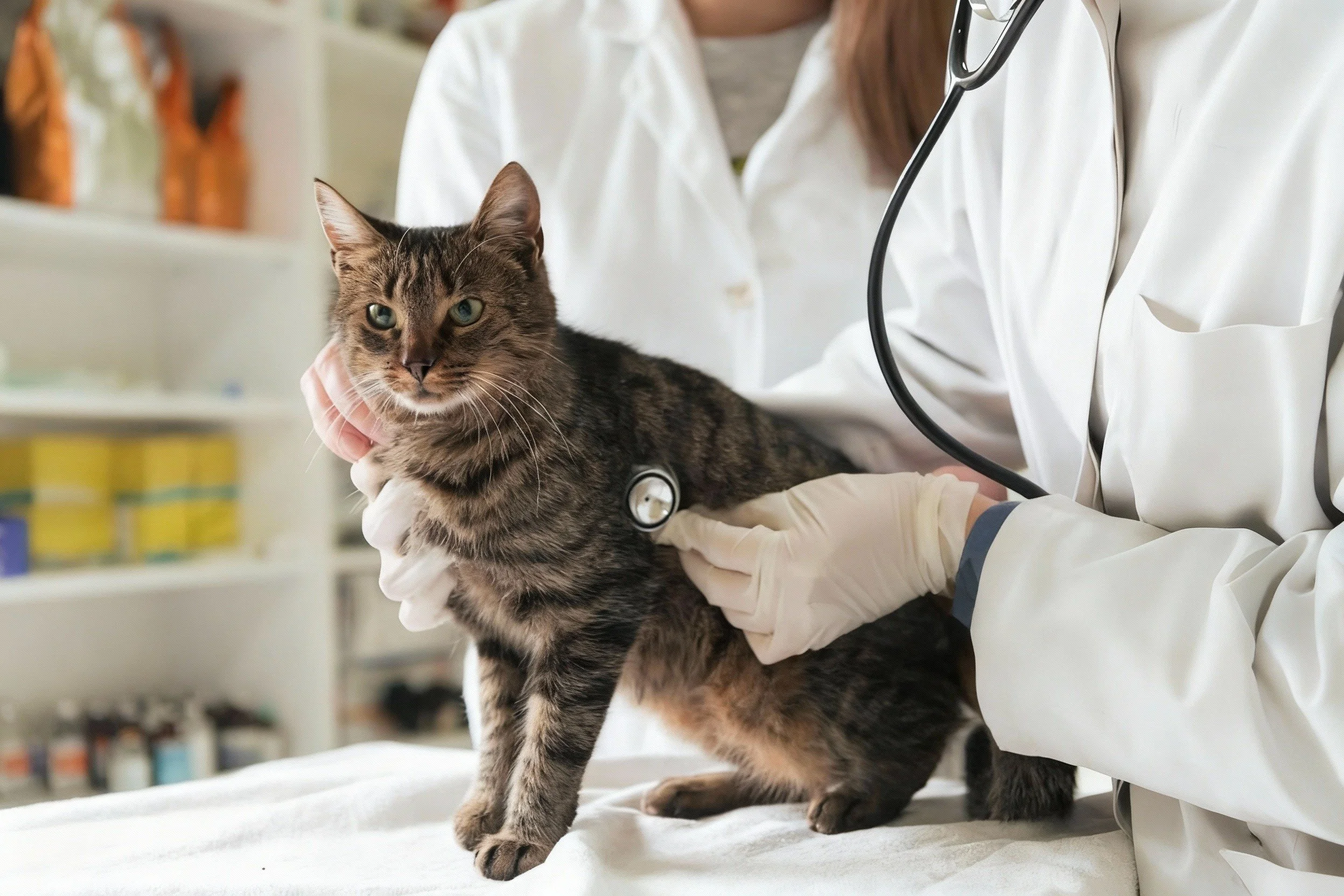Preventative Vet Care: Keeping Your Pet Healthy at Every Life Stage
Preventative veterinary care isn’t just a line on a checklist—it’s a plan for keeping your pet healthy, happy, and thriving for years to come. Every piece plays a role: vaccines protect against serious diseases, wellness exams catch small changes before they become big problems, parasite prevention keeps pests and illness at bay, and paying attention to behavior helps you spot early warning signs.
Staying consistent with these steps isn’t just smart; it reduces stress, can save money, and helps your pet feel their absolute best every day!
What counts as preventative veterinary care
Preventative care includes everything you do to maintain your pet’s health before symptoms appear. Regular check-ins allow you to notice small changes in behavior, appetite, or energy that could indicate early disease. It also ensures that your pet stays on top of vaccines, dental care, parasite protection, and other key health measures.
Some of the core actions include:
Vaccinations to prevent life-threatening illnesses
Wellness exams to monitor weight, behavior, and overall condition
Diagnostic screenings like bloodwork, urinalysis, and fecal tests
Dental care, including professional cleanings and home maintenance
Parasite prevention for fleas, ticks, and heartworm
Age-appropriate monitoring tailored to puppies, adults, and seniors
By combining these steps, you build a detailed health history for your pet, making it easier to spot subtle changes and intervene early.
Yearly wellness exams
Wellness exams provide your veterinarian with a comprehensive view of your pet’s health. These focus on physical condition, dental health, behavior, and lifestyle. During these visits, your vet evaluates your pet’s heart, lungs, skin, coat, joints, and abdominal organs to catch any changes that might indicate issue. Even minor signs, like a dog moving a little stiffly, or a cat grooming less than usual, can provide clues for early intervention.
Weight and body condition are assessed to detect metabolic changes, dietary issues, or discomfort. Dental health is also reviewed, as gum disease and tartar buildup can affect overall health if untreated. Your veterinarian will also discuss your pet’s behavior, activity levels, and environment, offering guidance on enrichment, exercise, and mental stimulation. These establish a baseline for your pet’s health, making it easier to notice small changes over time and enabling proactive care that keeps pets comfortable and happy!
Did you know? Dental disease is one of the most common health issues in adult pets but can be hard to spot at home. Check out this article to learn more about what you can do to keep your pet’s teeth happy and healthy.
Vaccines and key diagnostics
Vaccines and diagnostic tests are your pet’s best allies for staying healthy. Vaccines act like armor against serious diseases, while diagnostic screenings give you a sneak peek into what’s happening inside, even when your furry friend looks perfectly fine. Together, they let you catch problems early and stay one step ahead of potential health issues.
For cats, the core vaccines include FVRCP (Feline Viral Rhinotracheitis, Calicivirus, and Panleukopenia) and rabies, which is required in most areas. Depending on your cat’s lifestyle, your veterinarian might also recommend FeLV and FIV testing to check for viruses that can weaken their immune system. Pair these with routine bloodwork, urinalysis, and fecal tests, and you’re getting a full picture of kidney function, liver health, and gut wellness so nothing sneaky slips under the radar.
Dogs get their own superhero lineup: DHPP (Distemper, Hepatitis [Adenovirus-2], Parvovirus, Parainfluenza), rabies, Bordetella for kennel cough, and Leptospirosis if exposure risk is higher. The 4Dx test covers heartworm, Lyme, Ehrlichia, and Anaplasma. Adding routine bloodwork and urinalysis helps you monitor organ function, metabolism, and catch any early signs of chronic conditions.
By combining vaccines with diagnostics, you’re giving your pet both protection today and insight into tomorrow—a proactive approach that makes for healthier, happier pets!
Preventative care by life stage
Tailoring care to your pet’s age is key to keeping them healthy, happy, and thriving. Each stage of life comes with its own risks and priorities, and understanding what to focus on helps you prevent problems before they start.
Puppies and kittens
The first months are all about growth, immunity, and building a strong foundation. Early care can set your pet up for a lifetime of success.
Complete vaccine series and growth monitoring – Ensures immunity against serious diseases.
Parasite prevention for fleas, ticks, and heartworm – Starting early protects against infections that can affect long-term health.
Microchipping and permanent identification – Critical for safety and peace of mind. Learn ore about the importance of chipping your pet here!
Nutrition and development monitoring – Supports proper growth, muscle development, and health.
Early socialization and behavior guidance – Helps prevent anxiety or fear-based behaviors as your puppy or kitten matures.
Adult stage
Adult pets benefit from consistent care that maintains health and wellness.
Annual wellness exams for weight, dental health, and overall condition – Keeps an eye on long-term health trends.
Booster vaccines for core and lifestyle protection – Maintains immunity against diseases.
Year-round parasite prevention – Protects against both seasonal and hidden threats.
Enrichment and exercise – Supports mental stimulation, physical fitness, and overall wellbeing.
Senior pets
Seniors require closer monitoring to manage age-related changes and chronic conditions. Focused preventative care helps maintain comfort and quality of life.
Semi-annual wellness exams – Detects early signs of chronic conditions and age-related changes.
Expanded diagnostics including bloodwork and urinalysis – Helps catch issues that might be missed by a physical exam.
Joint and mobility support through supplements or therapy – Maintains movement and reduces pain.
Cognitive evaluations – Preserves mental function, which impact overall wellbeing.
Catching issues early and staying consistent
One of the smartest things you can do for your pet is to stay consistently tuned in to their health. Small changes, like skipping a meal, moving a little slower, or acting differently than usual, can be the first hints of something more serious, from dental problems to joint pain or early illness. Noticing these signs early gives you and your vet a head start, often making treatment easier and keeping your pet comfortable.
The key is building a simple rhythm around preventative care. Set reminders for vaccines, wellness exams, and parasite prevention so nothing is missed. When possible, bundle appointments such as vaccines, dental cleanings, and routine checkups into a single visit. This makes things easier for you and less stressful for your pet.
Keeping a journal or using an app to track meals, activity, and unusual behaviors can be very helpful. Over time, patterns emerge and small changes become easier to spot before they turn into bigger problems. Sharing this information with your veterinarian ensures everyone is on the same page and care decisions are proactive rather than reactive.
FAQs
How often should my pet visit the vet?
Puppies and kittens need multiple visits in their first year to complete vaccines and get boosters, while adult pets usually do well with an annual checkup. For seniors, many vets recommend exams every six months to catch age-related changes early.Do indoor pets need parasite prevention?
Yes! Fleas, ticks, and even heartworm can find their way indoors via shoes, other animals, or through open windows. Staying on top of prevention is important, even if your pet never leaves the house.Are all vaccines necessary?
Core vaccines are essential for every pet. Non-core vaccines depend on your pet’s lifestyle, exposure risk, and local disease prevalence. Your vet can help you tailor a plan.How can I tell if my pet is showing early signs of illness?
Watch for small changes in appetite, energy, bathroom habits, or behavior. Bringing your pet in for a checkup at the first sign of something unusual is the best way to catch problems early.What if I can’t afford all preventative care at once?
Focus on the essentials first: core vaccines, parasite prevention, and regular wellness exams. Many clinics offer wellness plans or payment options, so you can spread out care without compromising your pet’s health.
Final thoughts
Preventative care is about staying one step ahead and being present in your pet’s health journey. Vaccines, wellness exams, parasite prevention, and daily observations all work together to catch issues early and maintain overall well-being. By noticing subtle changes, keeping up with scheduled care, and partnering with your veterinarian, you give your pet the best chance at a long, healthy, and happy life, at every stage.
Sources and further reading
Periodontal disease - Cornell University College of Veterinary Medicine
Feline Calicivirus - Cornell University College of Veterinary Medicine
Kennel Cough in Dogs: Symptoms, Causes, and Treatment - PetMD
Leptospirosis in dogs -American Veterinary Medical Association
Anaplasmosis - Cornell University College of Veterinary Medicine
A Veterinarian’s Guide to Parasite Prevention in Pets - The Vets
Understanding Cognitive Dysfunction in Dogs and Cats - PetMD





